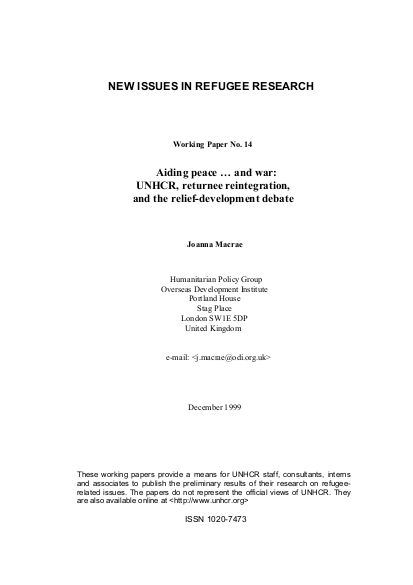
This paper seeks to situate UNHCR’s evolving policy with regard to reintegration in the context of wider debates on relief-development aid linkages, and of broader changes in international relations in the post-Cold War era. It is based on an analysis of the UNHCR’s policy approach to the issue of reintegration, as reflected in the decisions of the Executive Committee, global policy initiatives and guidelines. It is an analysis of the ideas which shape the organisation’s identity and practice, not an evaluation of operations. The paper argues that although UNHCR’s constituency is unique, its analysis of the challenge of reintegration has conformed with what might be seen as an emerging orthodoxy: namely that relief aid should serve a developmental role, and that it can and should play a role in peace-building. These claims have been based on an analysis of the causes of conflict which focuses largely on internal and economic factors. They also assume that developmental aid and principles can address these effectively. The solution to the ‘problem’ of reintegration has therefore been conceptualised as a problem of aid management. Improving the coordination and funding instruments, and adopting more developmental methodologies are proposed as the way to improve reintegration strategies. The paper questions this approach on a number of grounds. First, it suggests that despite some modification in terminology, UNHCR’s reintegration strategy continues to pivot on the concept of ‘post-conflict transition’, premised on a continuum from war to peace. This envisages a parallel aid transition from relief to development assistance. The persistence of this terminology is very misleading, since the majority of refugees return to situations of on-going conflict. There is also the assumption that a functioning state is in place in the country of origin, which has the legitimacy and the ability to coordinate and implement developmental policies.
